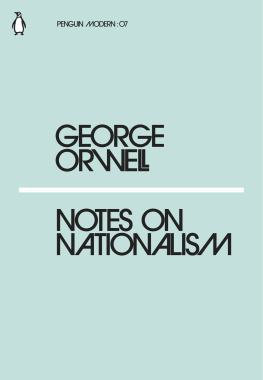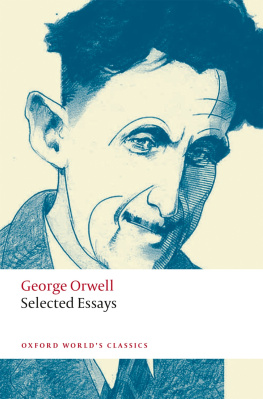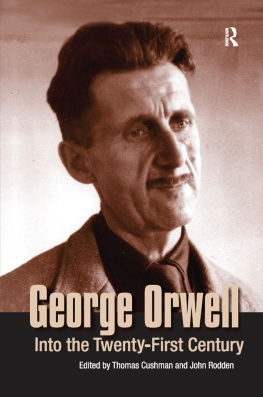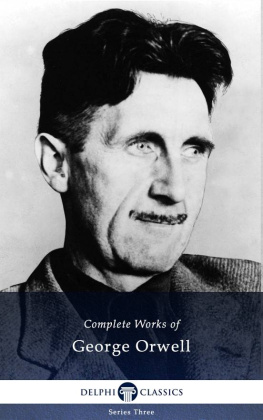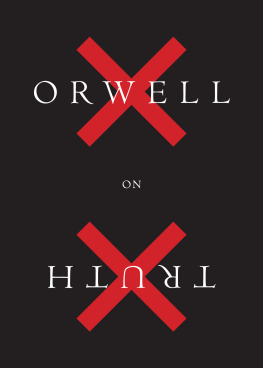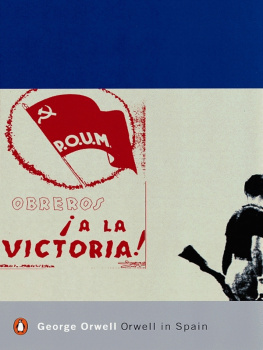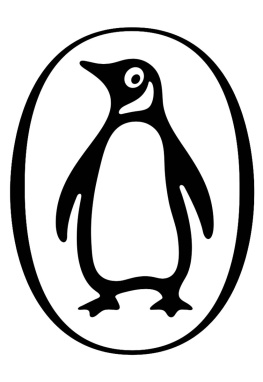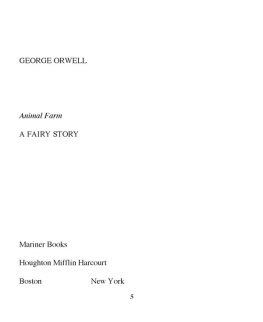Contents
Guide
Page List
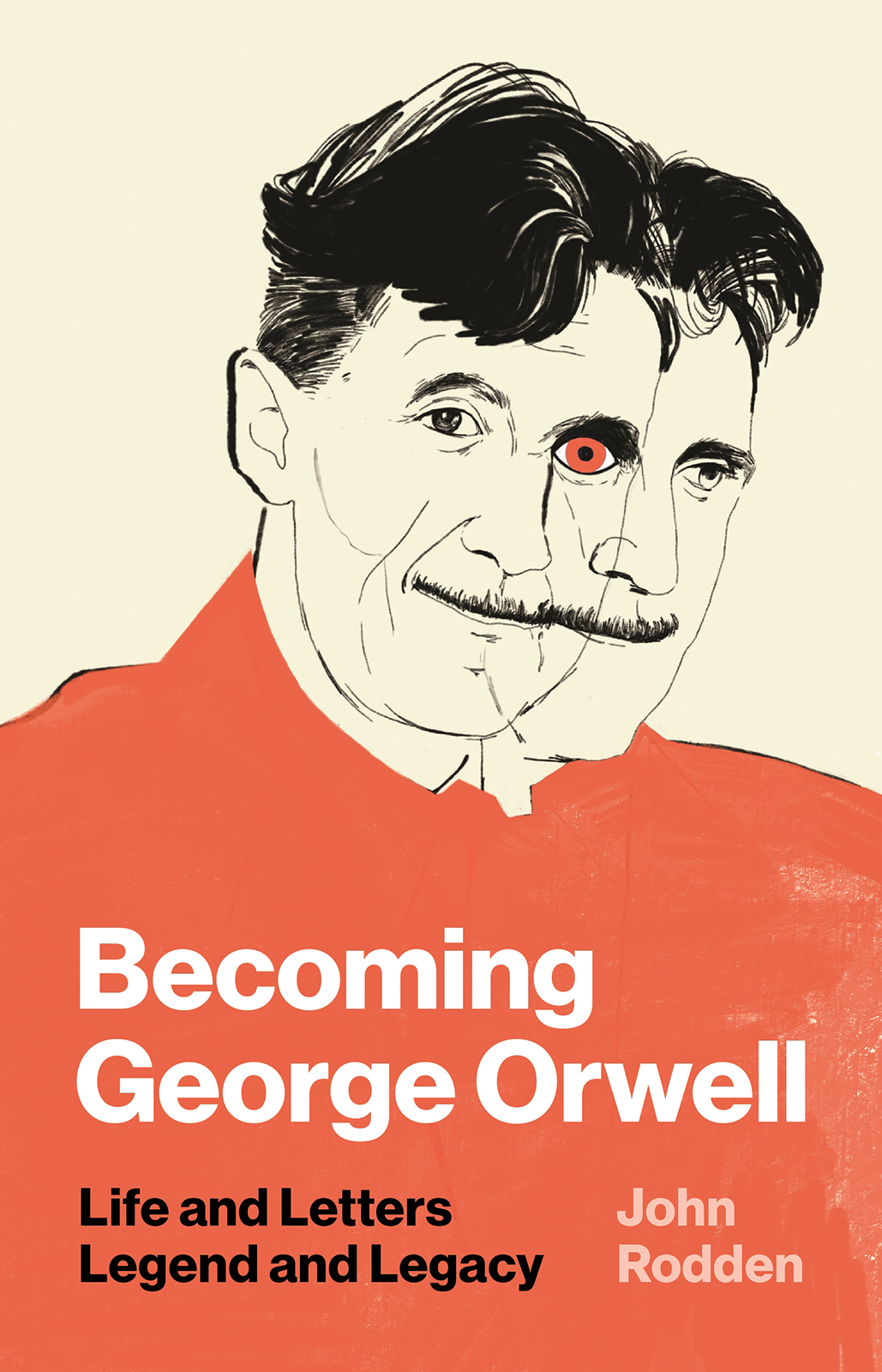
Becoming
George Orwell
Copyright 2020 by Princeton University Press
Published by Princeton University Press
41 William Street, Princeton, New Jersey 08540
6 Oxford Street, Woodstock, Oxfordshire OX20 1TR
press.princeton.edu
All Rights Reserved
LCCN 2018946113
ISBN 9780691190129
ISBN (e-book) 9780691190129
Version 1.0
British Library Cataloging-in-Publication Data is available
Editorial: Ben Tate, Hannah Paul, and Charlie Allen
Production Editorial: Natalie Baan
Text Design: Carmina Alvarez
Jacket Design: Matt Avery/Monograph
Production: Jacquie Poirier
Publicity: Jodi Price and Katie Lewis
Copyeditor: Sarah Vogelsong
Jacket illustration by Lauren Nassef
Rose Gallagher Rodden
19282018
with undying gratitude
Contents
ix
PROLOGUE
Donald and Winston at the Ministry of Alternative Facts 1
INTRODUCTION
Orwell, My Orwell 9
CHAPTER 1
The Quixotic, Adamantly Unsainted Life He Lived 27
CHAPTER 2
Frenemies at Fisticuffs? The Debate Rounds of Two Cordially Contentious Old Etonians 59
CHAPTER 3
The Literary Breakthrough, or When Blair Became Orwell 72
CHAPTER 4
Orwells Twin Masterpieces, Animal Farm and Nineteen Eighty-Four 90
CHAPTER 5
A Utopian Edition of a Dystopian Classic 109
CHAPTER 6
Englands Prose Laureate 124
CHAPTER 7
French Connection, Part 1: Jean Malaquais, a French Orwell? 141
CHAPTER 8
French Connection, Part 2: Camus and Orwell, Rebelles avec une cause 175
CHAPTER 9
How and Why Orwell Became A FAMOUS AUTHOR: Surfing the Tides of Time 194
CHAPTER 10
Catholic Exceptionalism: Why Catholic America Canonized St. George 221
CHAPTER 11
Orwellian Warfare: From Cold to Cyber 247
CHAPTER 12
Why I Am Not a Socialist 259
CONCLUSION
Whither Orwelland Orwell? 274
Acknowledgments
First I must acknowledge the extraordinary pleasure I have had in the company of the remarkable man and writer who has once again sat patiently for this portrait. Among his invaluable legacies to me has been to bring me into contact with many wonderful people who have played an important role in my life and work, and I welcome the opportunity to thank them here.
At Princeton University Press, the shrewd advice of Ben Tate has improved the book substantially. From its earliest stages, Ben has been a robust advocate of this book and encouraged me to approach it with an eye toward the informed general reader.
I also owe a large debt of gratitude to my old friend Peter Dougherty, former director of Princeton University Press, for his faith in this project since its infancy. At a later date, assistant editor Hannah Paul, editorial assistant Charlie Allen, production editor Natalie Baan, and copy editor Sarah Vogelsong were most generous and understanding as they shepherded the book through the production process. Natalie and Sarah devoted care and consideration to the manuscript and its author far beyond the duties of professionalism, extending to kindness and personal interest.
This book took much longer to complete than I had originally imagined when I first embarked on it. Throughout the decade of its gestation, I was assisted by personal friends and valued colleagues who shared their research with me, commented on portions of the manuscript, arranged public lectures, or otherwise stimulated my thinking.
In England, I have benefited from the generosity of Ian Angus, Ian Willison, Sarah Gibbs, Quentin Kopp, D. J. Taylor, Masha Karp, Richard Keeble, Tim Crook, Roger Howe, Sarah Gibbs, Peter Davison, and Dione Venables. At the University of Texas at Austin, Thomas Staley, former director of the Harry Ransom Center (HRC), and W. Roger Lewis, director of the Program in British Studies at the HRC, have been valued allies. Roger invited me to deliver an HRC lecture that came to form the basis of a chapter in this book and, quite beyond the scope of this project, has been gracious with my many queries and requests for help.
As many other scholars can confirm, one of the most enjoyable little adventures in the course of long hours of research involves the discovery of a long-stalked datum pursued merely to adorn a humble footnote. In this book the zaniest escapade was my tracking down information about the exact Washington hotline number of the John Birch Society during the Cold War, and I thank the long-suffering research staff of the Library of Congress for their good humor in checking tattered phone books, dusty newsletters, and forgotten correspondence from the 1950s onward as they stayed on the hunt at the behest of their obsessive client.
During the last decade, I have also been graced with the good fortune of regular dialogues or correspondence with a few friends who have shared their immense knowledge about British history in general and Orwells writings in particular: Scott Walter, Alan Munton, Henk Vynkier, Vincent Kling, and Jeffrey Meyers. Two other old friends, William Cain and Paul Cantor, helped me recast the book during its formative stages.
Another pair of cherished friends, Gorman Beauchamp and Jack Rossi, not only spent long hours on the phone in conversations about our shared intellectual passions but also volunteered to read sections of the manuscript. They furnished me wise and much-appreciated counsel. Two of the chapters emerged from articles coauthored with Professor Rossi, and I thank him for generously allowing me to draw on them for this book.
Several other mentors and teachers from my early years continue to occupy a large role in my life, among them Dave Efroymson, Jim Butler, Michael Levenson, and Michael Dillon. All of them have been edifying and indeed inspiring presences in my life across the decades.
Going even further back in time, I thank my first teacher-hero, my high school debate and English teacher, John Buettler, with whom I began to discuss Orwells Nineteen Eighty-Four as a 14-year-old schoolboy. Although John raised his eyebrows more than once at that teenagers chutzpah (or immaculate innocence), he steadfastly stood close by as I sallied forth and tilted at every windmill on my path. My quest extended to writing long letters to the FBI requesting information about their Orwellian surveillance policies and even conducting after-school telephone interviews with Bureau agents, who regularly called (to my mothers consternation) our (wiretapped?) phone for updates on my workand who proved eager to obtain a copy of my oratorical address denouncing them, a speech widely (and passionately) delivered at weekend forensic tournaments throughout Philadelphia.
A wide circle of comrades have provided support of still other kinds. Caleb Upson, James B. M. Schick, Jonathan Imber, Parker Thayer, Olivia Schultz, and Adam Bourenane have given me invaluable editorial assistance. Thomas Cushman, Bill Shanahan, Ethan Goffman, Erica Walter, Robert Boyers, Morris Dickstein, Gene Goodheart, and Alan Wald have shared their insight on a broad range of political and intellectual issues. The infectious good spirits of Raphael and Jack Bemporad, Lynn Hayden, Jud Smith, Mitch Baranowski, Zachary Cameron, and Anna Thibodeau have buoyed and bolstered me, as have the ministrations of a pair of good friends since ancient times, Kathleen OConnor and Greg Sokoloff, both of whom have reached out repeatedly across the miles and decades. Closer to home, so too have Ruth Maxwell, whose Christian charity has been exemplary, and Lance Harris, my co-conspirator of yore and the fairest of foul-weather friends. Lance has saved me from myself on countless occasions, tossing yet another custom-made life preserver into my sea of troubles and


